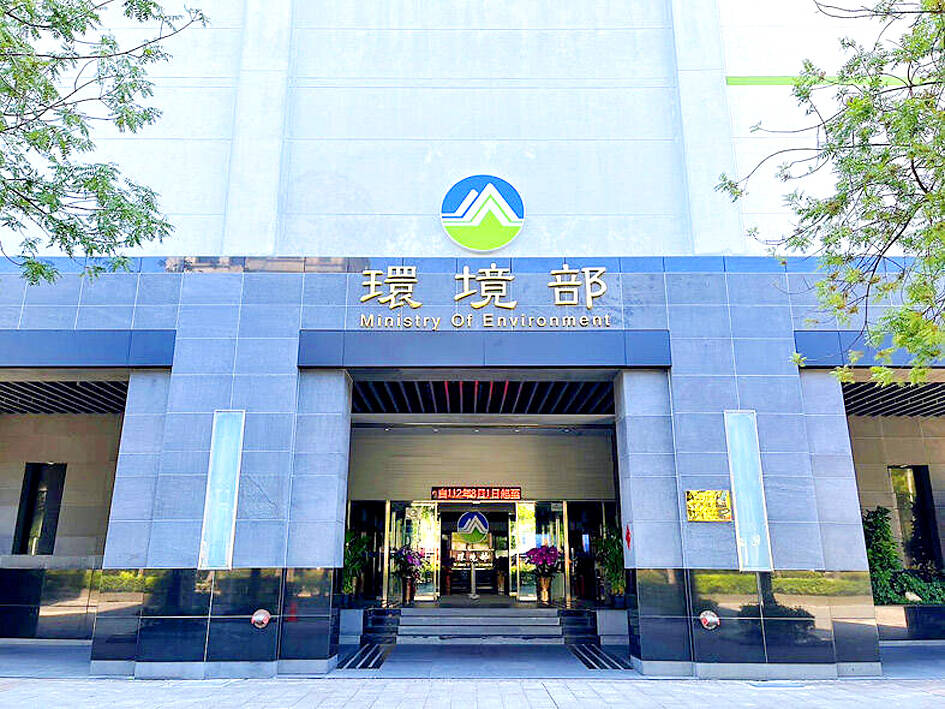The Ministry of Environment is launching a youth sustainability flagship project aiming to support young people in studying environmentalist policies overseas, Minister of Environment Peng Chi-ming (彭啟明) said yesterday.
The project is aimed at people aged 30 and younger, providing them with NT$1.5 million to NT$2 million (US$45,504 to US$60,672) to study sustainability abroad and bring knowledge of low-carbon policies to Taiwan, Peng said.
The Executive Yuan passed the “Youth Overseas Dream Fund” program in November last year, allocating NT$10 billion for young people to pursue their passions abroad.

Photo: Chen Chia-yi, Taipei Times
Under the program, each government agency would propose an annual flagship project, with this year’s theme being environmental sustainability.
The ministry is taking the lead by developing exchange opportunities with international sustainability organizations through its flagship project.
About 60 participants in the project would first intern at the ministry to learn about the government’s low-carbon initiatives and net zero policies, Peng said.
They would then travel to Europe to learn about carbon cap-and-trade systems, participate in international climate governance exchanges and assist countries in their global warming response work, he said.
Upon returning to Taiwan, the participants would apply the knowledge they gained abroad to help Taiwan implement low-carbon policies, he said.
Application details would be announced at the end of this month, he added.
The ministry is also working with major universities to create a program centered around net zero emissions, Peng said.
It plans to establish net zero training centers in the northern, central, southern and eastern regions of Taiwan, he said.
The National Environmental Research Academy would provide teaching materials and unified exams, and issue program certificates, he said.
The program is expected to begin recruiting in April and would train about 3,500 students, he added.
In other developments, the ministry is planning to hold on Friday the sixth environmental impact assessment (EIA) of Taiwan Power Co’s project to renovate the Hsieh-ho Power Plant (協和電廠).
The proposed project includes transforming the plant from an oil-fired facility into one powered by natural gas, as well as a land reclamation off Keelung’s Waimushan (外木山) to build a fourth liquefied natural gas (LNG) terminal.
The first and second versions of the project were not approved by the ministry’s EIA committee.
The third version reduced the land reclamation area to 14.5 hectares and shifted it eastward to the LNG unloading terminal’s harbor basin.
Burning natural gas would also emit air pollution, environmentalist organization Waimushan Protection Team said yesterday.
Northern Taiwan does not have an electricity shortage, it said.
The fourth terminal’s proximity to the Port of Keelung would impact its operations, it added.
If the ministry approves the proposed project, it would harm the port’s economic development, cause national security issues and sacrifice Keelung’s marine sustainability, it said.
The organization is planning to hold a news conference with other activist groups outside Keelung City Hall this morning, it said.
It called on Keelung Mayor George Hsieh (謝國樑) to participate in the environmental impact assessment and fulfill his pre-election promise of protecting the harbor and ocean.
Additional reporting by Tung Kuan-yi

Taiwanese can file complaints with the Tourism Administration to report travel agencies if their activities caused termination of a person’s citizenship, Mainland Affairs Council Minister Chiu Chui-cheng (邱垂正) said yesterday, after a podcaster highlighted a case in which a person’s citizenship was canceled for receiving a single-use Chinese passport to enter Russia. The council is aware of incidents in which people who signed up through Chinese travel agencies for tours of Russia were told they could obtain Russian visas and fast-track border clearance, Chiu told reporters on the sidelines of an event in Taipei. However, the travel agencies actually applied

Japanese footwear brand Onitsuka Tiger today issued a public apology and said it has suspended an employee amid allegations that the staff member discriminated against a Vietnamese customer at its Taipei 101 store. Posting on the social media platform Threads yesterday, a user said that an employee at the store said that “those shoes are very expensive” when her friend, who is a migrant worker from Vietnam, asked for assistance. The employee then ignored her until she asked again, to which she replied: "We don't have a size 37." The post had amassed nearly 26,000 likes and 916 comments as of this

New measures aimed at making Taiwan more attractive to foreign professionals came into effect this month, the National Development Council said yesterday. Among the changes, international students at Taiwanese universities would be able to work in Taiwan without a work permit in the two years after they graduate, explainer materials provided by the council said. In addition, foreign nationals who graduated from one of the world’s top 200 universities within the past five years can also apply for a two-year open work permit. Previously, those graduates would have needed to apply for a work permit using point-based criteria or have a Taiwanese company

The Shilin District Prosecutors’ Office yesterday indicted two Taiwanese and issued a wanted notice for Pete Liu (劉作虎), founder of Shenzhen-based smartphone manufacturer OnePlus Technology Co (萬普拉斯科技), for allegedly contravening the Act Governing Relations Between the People of the Taiwan Area and the Mainland Area (臺灣地區與大陸地區人民關係條例) by poaching 70 engineers in Taiwan. Liu allegedly traveled to Taiwan at the end of 2014 and met with a Taiwanese man surnamed Lin (林) to discuss establishing a mobile software research and development (R&D) team in Taiwan, prosecutors said. Without approval from the government, Lin, following Liu’s instructions, recruited more than 70 software